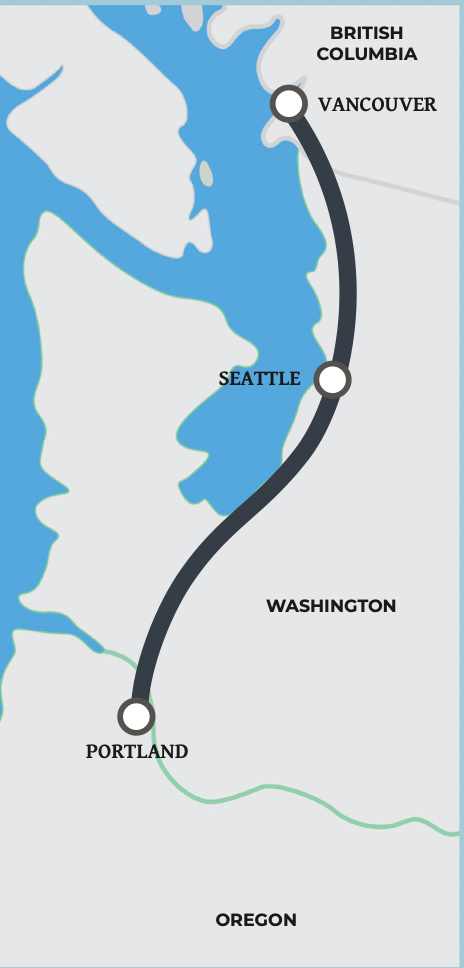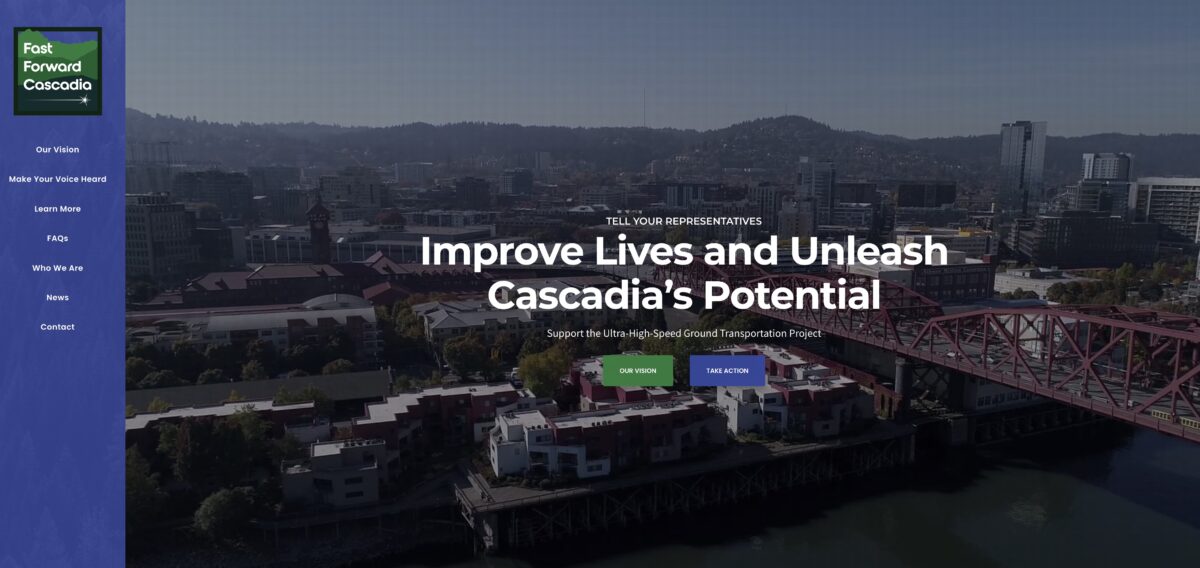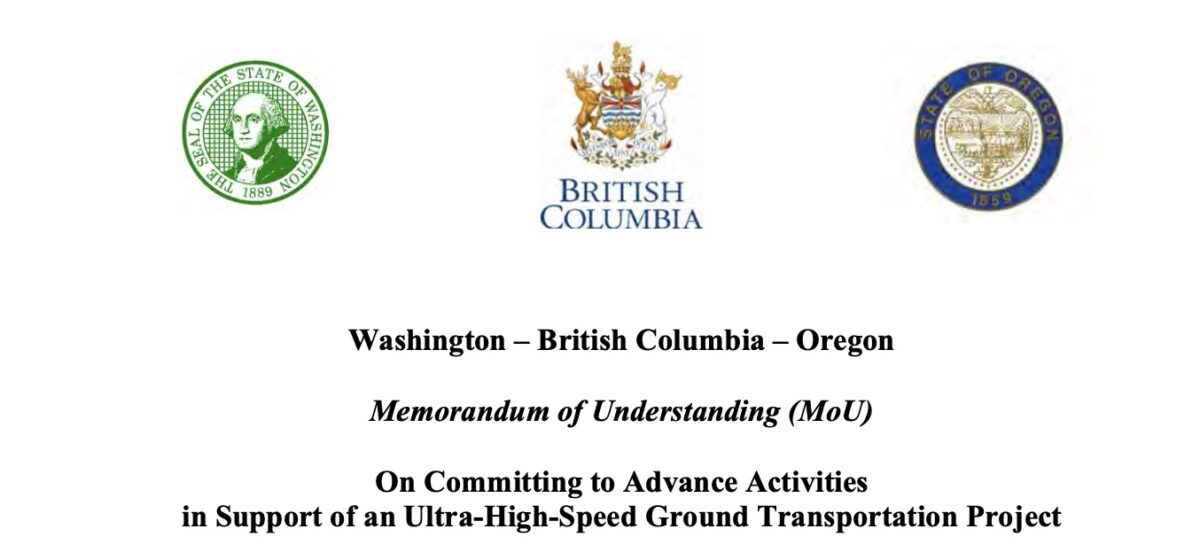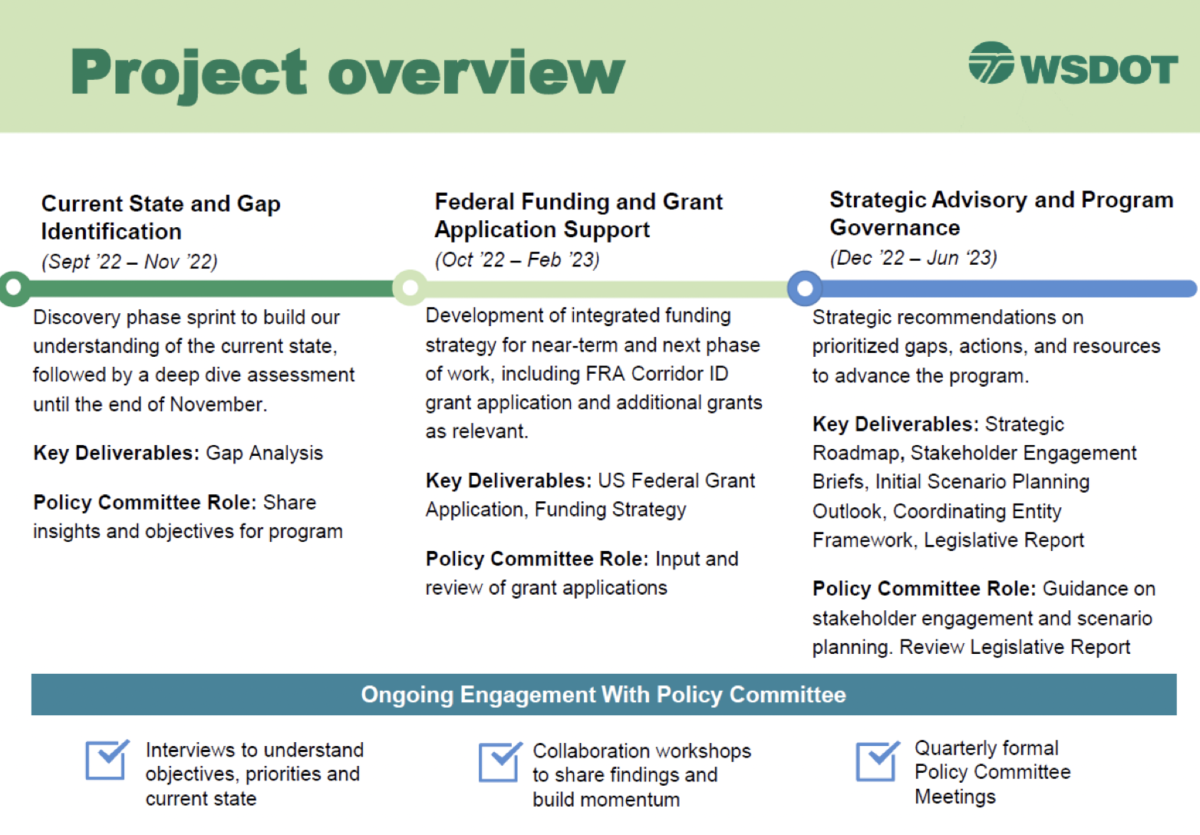The future is now — or so say the planners leading the Cascada Rail project to bring “ultra-high-speed ground transportation” (a.k.a. high speed rail, or HSR) to the corridor between Portland and Vancouver, British Columbia. While this project may seem far-fetched, regional leaders are giving us some hope that we’ll be whisking ourselves between Portland and Seattle at 250 mph sooner rather than later.
At last Friday morning’s Metro Transportation Policy Alternatives Committee (TPAC) meeting, planners from Metro and the Oregon and Washington State Departments of Transportation (ODOT and WSDOT) briefed the committee on the latest HSR updates. As it turns out, there has been quite a bit of progress on this project in the past couple years. The main agency leading this progress is WSDOT (the majority of tracks will be laid in Washington) but other agencies are supportive and on November 16, 2021, Oregon Governor Kate Brown, Washington Governor Jay Inslee and British Columbia Premier John Horgan signed a Memorandum of Understanding in a show of support.
As far as the North American west goes, the Cascadia Megaregion is quite dense, containing three of the most populated cities in the United States and Canada within a little more than 300 miles. The entire region has grown significantly in recent years and this growth is projected to continue in the coming decades by as much as four million people by 2050. This is one reason advocates think it’s so important to take urgent action on this project.

It’s difficult to fathom what a HSR system in the Pacific Northwest could do for our region. At 250 miles per hour, trips between Portland, Seattle and Vancouver could take less than an hour between each city. Theoretically, a Portlander could get to work at the Microsoft headquarters near Seattle in almost the same amount of time as it takes to drive to Intel in Hillsboro during rush hour today. Hell, you could even throw in a trip to Canada in the time it would take to get through the line at the original Starbucks in Pike Place Market.
The project planners have more a more detailed account of the benefits of Cascadia HSR. The Metro TPAC memo states:
This enhanced interconnectivity would unite the Cascadia megaregion and allow to better manage population and economic growth potential and maximize public transportation benefits, resulting in better access to jobs, affordable housing, shared resources, increased collaboration, and economic prosperity. Corridor study has conceptually considered various scenarios with 21 to 30 daily round trips, with some express trips stopping at only a few locations, interspersed with others that stop at more locations at about $24 to $42 billion in up- front construction costs.
Outcomes include:
— Ultimate potential to carry 32,000 people an hour (only 12 to 20 percent of total current intercity trips would shift to UHSGT).
— Estimated annual ridership between 1.7 and 3.1 million, conservatively.
— Estimated annual revenue of between $160 and $250 million.
— Estimated $355 billion in economic growth and 200,000 new jobs related to construction and ongoing operation of the service.
— Reduction of 6 million metric tons (tonnes) of CO2 emissions over first 40 years and potential for zero emissions by using clean energy sources (hydro, wind, solar).
Planners in Washington began the Cascadia HSR research process back in 2016. In late 2019, policymakers and business leaders convened in Seattle to discuss the future of the project, and the momentum continued from there. Perhaps the most actionable step came in November 2021, though, when the leaders of Oregon, Washington and British Columbia signed a Memorandum of Understanding (MoU) committing to “advance activities in support an ultra-high-speed ground transportation project.” Here’s an excerpt:
We commit to establishing a Policy Committee made up of Washington, Oregon and British Columbia designees and representatives from regional planning entities and the private sector to build relationships and coordinate efforts to advance the project. A lead from the respective government departments or ministries will be identified to spearhead the related activities in each of our jurisdictions and engagement in the Policy Committee.
We commit our states and province to advancing work on the Ultra-High-Speed Ground Transportation project and to pursuing emissions reduction with a focus on equity, inclusion and meaningful community engagement.
We commit to developing an organizational framework that facilitates inclusive input and decision-making…
While this MoU is not legally binding, it serves as documentation of a collective regional interest in this project and lists a few specific government commitments.
Skeptics may point out that American high speed rail has long been a transportation white whale, elusive even when it seems close to the surface. Just look at all the chaos surrounding the California HSR project. There are considerable roadblocks in the way of getting these types of projects done in a country so heavily oriented toward freeway projects.
Still, planners are optimistic. With WSDOT allocating $150 million to studying HSR in the Cascadia Corridor last March, the project is now in a development phase, and the team is currently researching more ways to secure federal (and possibly private) funding. (Note to Amtrak enthusiasts: this funding application will also include requests for assistance funding improvements to the Amtrak Cascades route, especially between Eugene and Portland.)
Portland Metro Council will discuss the corridor proposal and more details of the plan at a work session Tuesday (12/6). If they decide to sign on, that will be one more government agency in favor of the plan. It will take more than that to get it done, but it’s a start.
If you’re interested in this project, advocacy group Fast Forward Cascadia is asking people to voice their support to agency representatives and legislators. You can find more information about their campaign here.

Taylor has been BikePortland’s staff writer since November 2021. She has also written for Street Roots and Eugene Weekly. Contact her at taylorgriggswriter@gmail.com
"hear" - Google News
December 06, 2022 at 07:04AM
https://ift.tt/ucShlwx
Metro Council will hear plan for “ultra” high speed rail - BikePortland
"hear" - Google News
https://ift.tt/e8jvqJE
https://ift.tt/TNhECSU
Bagikan Berita Ini

















0 Response to "Metro Council will hear plan for “ultra” high speed rail - BikePortland"
Post a Comment